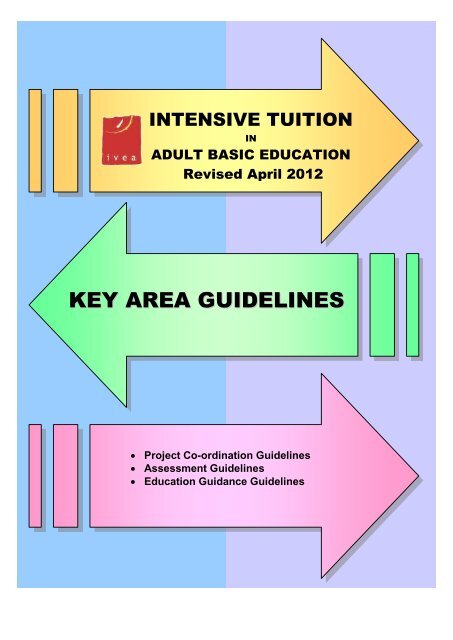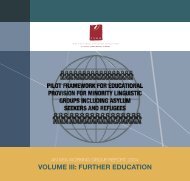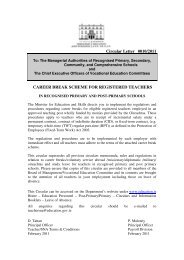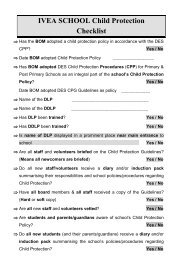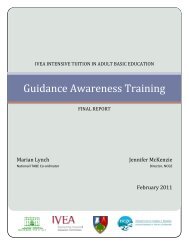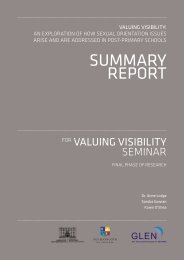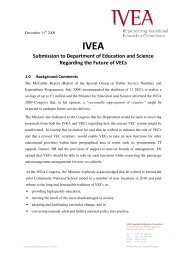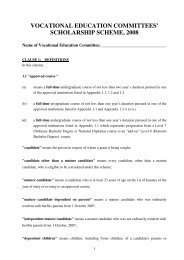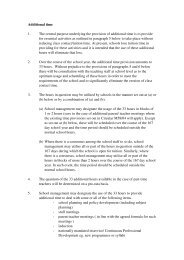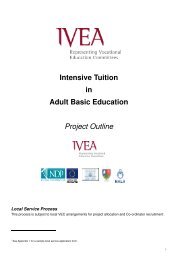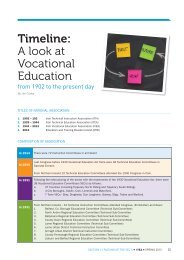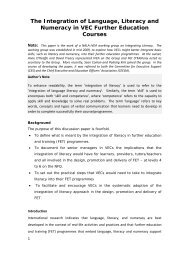(ITABE)... - Department of Education and Skills
(ITABE)... - Department of Education and Skills
(ITABE)... - Department of Education and Skills
Create successful ePaper yourself
Turn your PDF publications into a flip-book with our unique Google optimized e-Paper software.
INTENSIVE TUITION<br />
IN<br />
ADULT BASIC EDUCATION<br />
Revised April 2012<br />
KEY AREA GUIDELINES<br />
Project Co-ordination Guidelines<br />
Assessment Guidelines<br />
<strong>Education</strong> Guidance Guidelines
Key Area Guidelines ~ IVEA Intensive Tuition in Adult Basic <strong>Education</strong> Guidelines - April 2012<br />
IVEA Intensive Tuition in Adult Basic <strong>Education</strong>:<br />
Key Area Guidelines<br />
SECTION 1 4<br />
<strong>ITABE</strong> National Advisory Group 4<br />
Members <strong>of</strong> the Guidelines Development Group 4<br />
SECTION 2 5<br />
<strong>ITABE</strong> Pilot Programme 5<br />
The Need for Guidelines 5<br />
The Three Key Areas 5<br />
Project Co-ordination .......................................................................................................................... 5<br />
Assessment Procedures .................................................................................................................... 5<br />
<strong>Education</strong> Guidance ........................................................................................................................... 5<br />
SECTION 3 6<br />
<strong>ITABE</strong> PROJECT CO-ORDINATION GUIDELINES 6<br />
Background 6<br />
Flexible Approach 6<br />
Timing <strong>of</strong> Co-ordination Hours ........................................................................................................... 6<br />
Core Tutor .......................................................................................................................................... 6<br />
Recruitment 6<br />
Planning .............................................................................................................................................. 6<br />
Raising awareness ............................................................................................................................. 7<br />
Training & Development 7<br />
Training ............................................................................................................................................... 7<br />
Networking .......................................................................................................................................... 7<br />
Assessment & Evaluation 7<br />
Administering the <strong>ITABE</strong> Assessment ............................................................................................... 7<br />
Recording outcomes .......................................................................................................................... 7<br />
Agreeing use <strong>of</strong> assessment outcomes ............................................................................................. 7<br />
Curriculum Planning 8<br />
Planning Sessions .............................................................................................................................. 8<br />
Programme Development .................................................................................................................. 8<br />
Support 8<br />
Liaise between staff members ............................................................................................................ 8<br />
Provide support to tutors .................................................................................................................... 8<br />
Provide support to learners ................................................................................................................ 8<br />
Record Keeping & Reporting 8<br />
Keeping records ................................................................................................................................. 8<br />
Reporting ............................................................................................................................................ 8<br />
2
Key Area Guidelines ~ IVEA Intensive Tuition in Adult Basic <strong>Education</strong> Guidelines - April 2012<br />
SECTION 4 9<br />
ASSESSMENT PROCEDURE GUIDELINES 9<br />
Background 9<br />
Purpose 9<br />
Diagnose learner strengths <strong>and</strong> weaknesses .................................................................................... 9<br />
Assist in curriculum development / lesson planning......................................................................... 10<br />
Monitor progress............................................................................................................................... 10<br />
Provide a common reference point .................................................................................................. 10<br />
Generate statistical data ................................................................................................................... 10<br />
Staff Roles 11<br />
Adult Literacy Organiser (ALO) ........................................................................................................ 11<br />
<strong>ITABE</strong> Co-ordinator .......................................................................................................................... 11<br />
Group Tutor ...................................................................................................................................... 11<br />
Adult <strong>Education</strong> Guidance Service (AEGS) ..................................................................................... 11<br />
Assessment 12<br />
Timing <strong>of</strong> the assessment ................................................................................................................ 12<br />
Role <strong>of</strong> informed judgment ............................................................................................................... 12<br />
Evidence ........................................................................................................................................... 12<br />
Administering the assessment ......................................................................................................... 12<br />
Analysis & Use 13<br />
Capturing a 'snapshot' ...................................................................................................................... 13<br />
Recording outcomes ........................................................................................................................ 13<br />
Agreeing use <strong>of</strong> assessment outcomes ........................................................................................... 13<br />
SECTION 5 14<br />
ADULT EDUCATION GUIDANCE GUIDELINES 14<br />
Background ...................................................................................................................................... 14<br />
Purpose <strong>of</strong> AEGS Involvement ......................................................................................................... 14<br />
Guidance Model ............................................................................................................................... 14<br />
Local Area Plan (LAP) ...................................................................................................................... 15<br />
Planning ............................................................................................................................................ 15<br />
SECTION 6 16<br />
Additional Recommendations 16<br />
Co-ordination .................................................................................................................................... 16<br />
Assessment ...................................................................................................................................... 16<br />
Inservice Training ............................................................................................................................. 16<br />
Annual Review.................................................................................................................................. 16<br />
.<br />
3
Key Area Guidelines ~ IVEA Intensive Tuition in Adult Basic <strong>Education</strong> Guidelines - April 2012<br />
SECTION 1<br />
<strong>ITABE</strong> National Advisory Group (2012)<br />
<br />
Mary Kett<br />
Further <strong>Education</strong> Co-ordinator, Dept. <strong>of</strong> <strong>Education</strong> & <strong>Skills</strong><br />
<br />
<br />
<br />
<br />
<br />
<br />
Justina Corcoran<br />
Assistant Principle Officer, Dept. <strong>of</strong> <strong>Education</strong> & <strong>Skills</strong><br />
Fiona Hartley (Chair)<br />
Chief Executive Officer, Co. Wicklow VEC<br />
France Stephenson<br />
Adult Literacy Organisers’ Association / Co. Longford VEC<br />
John Stewart<br />
National Adult Literacy Co-ordinator / NALA<br />
Jennifer McKenzie<br />
Director, National Centre for Guidance in <strong>Education</strong><br />
Marian Lynch<br />
National Co-ordinator for the <strong>ITABE</strong> Programme / Co. Dublin VEC<br />
Members <strong>of</strong> the Guidelines Development Group (2006)<br />
<br />
<br />
<br />
(Terry McCann <strong>ITABE</strong> National Co-ordinator)<br />
Adult Literacy Organisers<br />
• Carmel Lee (Cavan VEC)<br />
• Mary Ryder (City <strong>of</strong> Cork VEC)<br />
• Bríd McIntyre (Donegal VEC)<br />
• Ann McCann (Co. Dublin VEC)<br />
• Gretta Vaughan (Co. Limerick VEC)<br />
• Briege Clarke (Co. Roscommon VEC)<br />
• Mary Roche (South Tipperary VEC)<br />
• Frances Ryan (Wexford VEC)<br />
• Niamh Maguire (Wicklow VEC)<br />
Adult <strong>Education</strong> Guidance Counsellors<br />
• Hazel Stanley (Cavan VEC)<br />
• Andrea McCarthy (City <strong>of</strong> Cork VEC)<br />
• Dearbhla Kelly (Donegal VEC)<br />
• Patrick Stewart (Co. Dublin VEC)<br />
• Jim Quinlan (Co. Limerick VEC)<br />
• Marie Delaney (Co. Roscommon VEC)<br />
• Tom Ryan (South Tipperary VEC)<br />
• Grace Finlay (Wexford VEC)<br />
• Catherine Greene (Wicklow VEC)<br />
<strong>ITABE</strong> Co-ordinators<br />
• Angela Newman (Cavan VEC)<br />
• Agnes McLaughlin (Donegal VEC)<br />
• Anne Terrritt (Co. Dublin VEC)<br />
• Mary Gallagher (Co. Limerick VEC)<br />
• Geraldine Raferty (Co. Roscommon VEC)<br />
• Shirley O’Flaherty (South Tipperary VEC)<br />
• Michael Sheehan / Jackie Browne (Wexford VEC)<br />
• Barbara Hammond (Wicklow VEC)<br />
4
Key Area Guidelines ~ IVEA Intensive Tuition in Adult Basic <strong>Education</strong> Guidelines - April 2012<br />
SECTION 2<br />
<strong>ITABE</strong> Pilot Programme<br />
The aim <strong>of</strong> the programme was to provide participants, in groups <strong>of</strong> 6 – 8 students,<br />
with an opportunity to access 6 hours <strong>of</strong> tuition per week over a 14 week period as<br />
opposed to the average <strong>of</strong> 2 hours per week currently provided.<br />
A number <strong>of</strong> these projects were allocated to each <strong>of</strong> the 33 VECs. The allocation<br />
process was based on statistical data submitted to the <strong>Department</strong> <strong>of</strong> <strong>Education</strong><br />
<strong>and</strong> Science as part <strong>of</strong> the national annual reporting structure for VEC adult<br />
literacy services.<br />
This was a joint project led by the IVEA, in partnership with NALA, with the coordination<br />
<strong>of</strong> the project provided by County Dublin VEC.<br />
The <strong>ITABE</strong> project was supported by an Advisory Group comprising <strong>of</strong><br />
representatives <strong>of</strong> the <strong>Department</strong> <strong>of</strong> <strong>Education</strong> & Science, The Irish Vocational<br />
<strong>Education</strong> Association, The VEC Literacy Forum, The National Adult Literacy<br />
Agency <strong>and</strong> the National Centre for Guidance in <strong>Education</strong>.<br />
The Need for Guidelines<br />
Through the evaluation process for the <strong>ITABE</strong> Pilot Programme the need was<br />
identified for guidelines in a number <strong>of</strong> key areas <strong>of</strong> the project. The <strong>ITABE</strong><br />
National Advisory Group made a recommendation to the <strong>Department</strong> <strong>of</strong> <strong>Education</strong><br />
& Science to develop these guidelines using the unused funds from the original<br />
pilot project <strong>and</strong> a structure to carry out this work was agreed in August 2006.<br />
Following an application process 9 Vocational <strong>Education</strong> Committees were<br />
selected to develop <strong>and</strong> pilot the guidelines over the autumn term 2006.<br />
The Three Key Areas<br />
Project Co-ordination<br />
“In t<strong>and</strong>em with the provision <strong>of</strong> a Resource Worker for local adult literacy<br />
services, clear guidelines indicating the role <strong>and</strong> responsibilities <strong>of</strong> project coordinators<br />
should be developed <strong>and</strong> adopted across the VEC sector.”<br />
Recommendation from the <strong>ITABE</strong> Pilot Programme Evaluation Report<br />
Assessment Procedures<br />
“Clear operating guidelines <strong>and</strong> training in the use <strong>of</strong> assessment materials<br />
must be a feature <strong>of</strong> future <strong>ITABE</strong> programmes.”<br />
Recommendation from the <strong>ITABE</strong> Pilot Programme Evaluation Report<br />
<strong>Education</strong> Guidance<br />
“To facilitate improved co-operation between the ALS <strong>and</strong> the AEGS clear<br />
guidelines to support AEGS involvement in <strong>ITABE</strong> programmes should be<br />
developed. These guidelines should be accompanied by the development <strong>of</strong><br />
an awareness training programme through which staff members <strong>of</strong> both the<br />
ALS <strong>and</strong> AEGS can gain a greater underst<strong>and</strong>ing <strong>of</strong> the interdependency <strong>of</strong><br />
their respective services <strong>and</strong> the potential for future development.”<br />
Recommendation from the <strong>ITABE</strong> Pilot Programme Evaluation Report<br />
5
Key Area Guidelines ~ IVEA Intensive Tuition in Adult Basic <strong>Education</strong> Guidelines - April 2012<br />
SECTION 3<br />
<strong>ITABE</strong> PROJECT CO-ORDINATION GUIDELINES<br />
Background<br />
The inclusion <strong>of</strong> specific co-ordination hours in each <strong>ITABE</strong> local project is crucial<br />
to the success <strong>of</strong> the programme. This is especially so given the current staffing<br />
levels within local VEC Adult Literacy Services.<br />
It should be noted that Adult Literacy Organisers (ALOs) are responsible for the<br />
effective operation <strong>of</strong> local <strong>ITABE</strong> projects, within the appropriate VEC<br />
management structure. The role <strong>of</strong> the <strong>ITABE</strong> Co-ordinator is to support the ALO<br />
in the management <strong>of</strong> the project or projects.<br />
In order to maximise the benefit <strong>of</strong> having a specific co-ordinator for <strong>ITABE</strong> it is<br />
necessary to define the role <strong>and</strong> for participating VECs to make every effort to<br />
ensure a certain level <strong>of</strong> uniformity across the sector.<br />
For this reason the following guidelines have been developed.<br />
Flexible Approach<br />
Timing <strong>of</strong> Co-ordination Hours<br />
While the 25% <strong>of</strong> tuition hours allocated to co-ordination for groups <strong>of</strong> 6 – 8<br />
learners can be divided into an average number <strong>of</strong> hours per week over the<br />
period <strong>of</strong> the tuition project this is not the most efficient way to allocate the<br />
hours. Timing <strong>of</strong> the co-ordination hours should take into account peak<br />
times during the lifetime <strong>of</strong> the project <strong>and</strong> hours should be allocated<br />
accordingly.<br />
Core Tutor<br />
In keeping with good practice <strong>and</strong> to maximise contact with learners the<br />
possibility <strong>of</strong> the <strong>ITABE</strong> Co-ordinator also acting as Core Tutor should be<br />
explored. Given the extended period <strong>of</strong> tuition each week it would be best if<br />
a team teaching approach was used.<br />
It is recommended that the <strong>ITABE</strong> Co-ordinator is not the sole tutor.<br />
Recruitment<br />
Planning<br />
Recruitment for <strong>ITABE</strong> projects should be planned in advance by the<br />
ALO in keeping with annual development plans <strong>and</strong> local planning<br />
procedures.<br />
6
Key Area Guidelines ~ IVEA Intensive Tuition in Adult Basic <strong>Education</strong> Guidelines - April 2012<br />
Raising awareness<br />
The <strong>ITABE</strong> Co-ordinator may-<br />
take active part in raising awareness amongst existing Adult Literacy<br />
Service (ALS) students <strong>of</strong> the availability <strong>and</strong> benefits <strong>of</strong> the<br />
programme.<br />
assist the ALO in the distribution <strong>of</strong> promotional material relating to the<br />
<strong>ITABE</strong> programme.<br />
Training & Development<br />
Training<br />
It is essential that the <strong>ITABE</strong> Co-ordinator avail <strong>of</strong> any training directly<br />
related to intensive tuition if <strong>and</strong> when it becomes available.<br />
Networking<br />
The value <strong>of</strong> networking with other practitioners is self-evident <strong>and</strong> <strong>ITABE</strong><br />
Co-ordinators must be encouraged <strong>and</strong> facilitated to create links with<br />
people in similar positions across the country.<br />
Assessment & Evaluation<br />
Administering the <strong>ITABE</strong> Assessment<br />
Carrying out assessments <strong>and</strong> evaluations is a major element <strong>of</strong> the <strong>ITABE</strong><br />
Co-ordinator's role.<br />
The role <strong>of</strong> the <strong>ITABE</strong> Co-ordinator in the assessment process is-<br />
to ensure learners are aware <strong>of</strong> the assessment process before it takes<br />
place<br />
to ensure active participation by the learner in completing the<br />
assessment checklists<br />
to carryout the assessment process with each learner <strong>and</strong> at the<br />
appropriate times<br />
to maintain assessment records<br />
to inform the learner, tutor/s <strong>and</strong> ALO <strong>of</strong> the assessment outcomes<br />
to work with the student <strong>and</strong> tutor/s to develop an appropriate<br />
curriculum taking into account assessment outcomes <strong>and</strong> student goals<br />
Recording outcomes<br />
The <strong>ITABE</strong> Co-ordinator should record assessment <strong>and</strong> evaluation<br />
outcomes on the forms provided <strong>and</strong> store them in keeping with procedures<br />
set down by the local VEC <strong>and</strong> ALS.<br />
Agreeing use <strong>of</strong> assessment outcomes<br />
It is the responsibility <strong>of</strong> the <strong>ITABE</strong> Co-ordinator to make learners aware <strong>of</strong><br />
the purpose <strong>and</strong> process <strong>of</strong> assessment <strong>and</strong> evaluation. They should know<br />
exactly who will have access to their results <strong>and</strong> for what purpose. For<br />
example summary data will be collected to provide statistical returns to the<br />
<strong>Department</strong> <strong>of</strong> <strong>Education</strong> & Science.<br />
7
Key Area Guidelines ~ IVEA Intensive Tuition in Adult Basic <strong>Education</strong> Guidelines - April 2012<br />
Curriculum Planning<br />
Planning Sessions<br />
The <strong>ITABE</strong> Co-ordinator should assist the learners <strong>and</strong> relevant staff members to<br />
develop individual learning plans <strong>and</strong> support the tutors in designing session<br />
plans.<br />
Programme Development<br />
The <strong>ITABE</strong> Co-ordinator should submit to the ALO a programme outline at the<br />
outset <strong>of</strong> the programme/course.<br />
Support<br />
Under the supervision <strong>of</strong> the ALO the <strong>ITABE</strong> Co-ordinator should-<br />
Liaise between staff members<br />
To facilitate an integrated approach to intensive tuition provision it is necessary for<br />
the <strong>ITABE</strong> Co-ordinator to liaise between appropriate staff members (for example<br />
the AEGS) on behalf <strong>of</strong> the learners .<br />
Provide support to tutors<br />
The <strong>ITABE</strong> Co-ordinator should ensure an appropriate level <strong>of</strong> support is provided<br />
to tutors, especially in the areas <strong>of</strong> curriculum development <strong>and</strong> resource<br />
identification.<br />
Provide support to learners<br />
Often where a number <strong>of</strong> tutors are involved in an intensive tuition programme the<br />
<strong>ITABE</strong> Co-ordinator will be the person within the ALS with whom learners have<br />
most frequent contact, especially if the co-ordinator is also the core tutor. For this<br />
reason the Co-ordinator should ensure that 1:1 support is provided to learners as<br />
needed.<br />
Record Keeping & Reporting<br />
Keeping records<br />
The <strong>ITABE</strong> Co-ordinator should maintain all records relating to the <strong>ITABE</strong> project/s<br />
for which they are responsible.<br />
Reporting<br />
The <strong>ITABE</strong> Co-ordinator should provide reports in keeping with local <strong>and</strong> national<br />
requirements.<br />
8
Key Area Guidelines ~ IVEA Intensive Tuition in Adult Basic <strong>Education</strong> Guidelines - April 2012<br />
SECTION 4<br />
ASSESSMENT PROCEDURE GUIDELINES<br />
Background<br />
The use <strong>of</strong> a variety <strong>of</strong> assessment material by local adult literacy services (ALS)<br />
to ascertain learner strengths <strong>and</strong> weaknesses assist in the development <strong>of</strong> a<br />
learning plan <strong>and</strong> provide statistical data in relation to literacy levels was<br />
commonplace when Phase 1 <strong>of</strong> the <strong>ITABE</strong> Pilot Programme was implemented. In<br />
order to provide data to examine indications <strong>of</strong> the efficacy <strong>of</strong> intensive tuition it<br />
was necessary for adult literacy services participating in Phase 1 <strong>of</strong> the <strong>ITABE</strong><br />
Pilot Programme to use a common system to measure skills <strong>and</strong> knowledge in the<br />
key areas <strong>of</strong> listening & speaking, reading, writing <strong>and</strong> numeracy.<br />
In the absence <strong>of</strong> an assessment process <strong>and</strong> materials common to all<br />
participating ALS it was decided that a sub-group <strong>of</strong> the <strong>ITABE</strong> National Advisory<br />
Group would develop an assessment instrument to be piloted as part <strong>of</strong> the <strong>ITABE</strong><br />
programme.<br />
A key factor in the development <strong>of</strong> the assessment material was the need for it to<br />
be in keeping with good practice guidelines for adult literacy provision. This meant<br />
the assessment could not take on the form <strong>of</strong> a st<strong>and</strong>ardised test but rather must<br />
be a negotiated statement <strong>of</strong> the learner's perceived ability supported, where<br />
possible, by the informed judgment <strong>of</strong> the ALO <strong>and</strong> tutor/s.<br />
A number <strong>of</strong> other factors contributed to the format <strong>and</strong> design <strong>of</strong> the assessment<br />
instrument –<br />
the lack <strong>of</strong> any appropriate st<strong>and</strong>ardised test developed for use in adult<br />
literacy work.<br />
the timeframe for the development <strong>of</strong> the assessment tool, briefing the<br />
services on its use <strong>and</strong> implementation <strong>of</strong> pre-course assessments.<br />
the need to include the student in the assessment process as an active<br />
participant in the direction <strong>of</strong> his/her learning.<br />
the potential to use the informed judgement <strong>of</strong> ALO <strong>and</strong> tutors to support<br />
the assessment process.<br />
Taking all <strong>of</strong> these factors into account led to the development <strong>of</strong> a series <strong>of</strong><br />
checklists mapped to National Framework <strong>of</strong> Qualifications (NFQ) levels 1 - 3 <strong>and</strong><br />
broken down into 3 further sub-levels (stages). The FETAC statements were<br />
closely linked to the NALA Mapping the Learning Journey framework <strong>and</strong> this<br />
ensured clear links in relation to levels <strong>and</strong> st<strong>and</strong>ards across the three frameworks<br />
– FETAC, MLJ <strong>and</strong> <strong>ITABE</strong>.<br />
Purpose<br />
Diagnose learner strengths <strong>and</strong> weaknesses<br />
The primary purpose <strong>of</strong> the <strong>ITABE</strong> assessment process is to identify <strong>and</strong><br />
record learner strengths <strong>and</strong> weaknesses within the four skills <strong>and</strong><br />
9
Key Area Guidelines ~ IVEA Intensive Tuition in Adult Basic <strong>Education</strong> Guidelines - April 2012<br />
knowledge based categories - speaking & listening, reading, writing <strong>and</strong><br />
numeracy.<br />
It is accepted that the model <strong>of</strong> adult basic education provision operated by<br />
adult literacy services equally values other areas <strong>of</strong> development such as<br />
fluency, independence <strong>and</strong> transferability, as means to improve social<br />
participation. This model also values progress made in s<strong>of</strong>t skills essential<br />
to both social interaction <strong>and</strong> the improvement <strong>of</strong> skills <strong>and</strong> knowledge.<br />
Given the restrictions imposed by time <strong>and</strong> the absence, <strong>and</strong> in many<br />
opinions inappropriateness, <strong>of</strong> summative assessment statements to<br />
measure s<strong>of</strong>t skills, these improvements are recorded as part <strong>of</strong> the<br />
qualitative data gathered within the evaluation process.<br />
Assist in curriculum development / lesson planning<br />
Given the fact that the summative measurement <strong>of</strong> skills <strong>and</strong> knowledge<br />
requires the use <strong>of</strong> the same pre <strong>and</strong> post course statements it is logical<br />
that if progress is to be measured some <strong>of</strong> the gaps identified should be<br />
addressed through the tuition programme.<br />
This need not dictate the curriculum for the project. The agreed curriculum<br />
should address the expressed <strong>and</strong> assessed needs <strong>of</strong> the participating<br />
learners <strong>and</strong> relevant gaps identified through the <strong>ITABE</strong> assessment<br />
process can be embedded into the planned learning outcomes.<br />
Monitor progress<br />
Again it must be borne in mind that the assessment checklists only<br />
measure progress in the specific areas for which they were designed -<br />
speaking & listening, reading, writing <strong>and</strong> numeracy. In addition it should be<br />
noted that measuring progress in relation to each <strong>of</strong> the checklist<br />
statements can only take place if opportunities to improve identified<br />
weaknesses are included in the course activities.<br />
It is recommended that progress made in areas <strong>of</strong> learning other than those<br />
measured through use <strong>of</strong> the Assessment Pack should also be documented<br />
<strong>and</strong> may be submitted with assessment documentation.<br />
Provide a common reference point<br />
There is a need to provide a common reference point when attempting to<br />
capture a national picture <strong>of</strong> needs <strong>and</strong> progress. Therefore the use <strong>of</strong> the<br />
same assessment materials, even bearing in mind the need for the<br />
interpretation <strong>of</strong> results, can provide that commonality, especially where the<br />
materials are mapped to the NFQ.<br />
Generate statistical data<br />
In order to generate a national picture <strong>of</strong> the benefits <strong>of</strong> intensive tuition it is<br />
necessary to use a measurement system which can be related to national<br />
(NFQ) education levels.<br />
10
Key Area Guidelines ~ IVEA Intensive Tuition in Adult Basic <strong>Education</strong> Guidelines - April 2012<br />
Staff Roles<br />
Adult Literacy Organiser (ALO)<br />
The role <strong>of</strong> the ALO in the assessment process for <strong>ITABE</strong> is-<br />
to ensure the Co-ordinator underst<strong>and</strong>s <strong>and</strong> is capable <strong>of</strong> administering<br />
the assessment process<br />
to ensure all participants are aware <strong>of</strong> the purpose <strong>and</strong> process <strong>of</strong> the<br />
assessment<br />
to ensure active participation by the learner in completing the<br />
assessment checklists<br />
to supply any information impacting on the assessment outcomes<br />
(informed judgement)<br />
to ensure the assessment takes place at the appropriate times<br />
to make the AEGC aware <strong>of</strong> assessment outcomes where they might<br />
inform AEGS input into the programme<br />
to take part in the development <strong>of</strong> an appropriate curriculum based on<br />
assessment outcomes <strong>and</strong> student goals<br />
<strong>ITABE</strong> Co-ordinator<br />
The role <strong>of</strong> the <strong>ITABE</strong> Co-ordinator in the assessment process is-<br />
to ensure learners are aware <strong>of</strong> the assessment process before initial<br />
assessment takes place<br />
to ensure active participation by the learner in completing the<br />
assessment checklists<br />
to carryout the assessment process with each learner <strong>and</strong> at the<br />
appropriate times<br />
to maintain assessment records<br />
to inform the learner, tutor/s <strong>and</strong> ALO <strong>of</strong> the assessment outcomes<br />
to work with the student <strong>and</strong> tutor/s to develop an appropriate<br />
curriculum taking into account assessment outcomes <strong>and</strong> student goals<br />
Group Tutor<br />
The role <strong>of</strong> the tutor in the assessment process is -<br />
to supply any information impacting on the assessment outcomes<br />
(informed judgement)<br />
to be aware <strong>of</strong> the assessment outcomes<br />
to take part in the development <strong>of</strong> an appropriate curriculum based on<br />
assessment outcomes <strong>and</strong> student goals<br />
Adult <strong>Education</strong> Guidance Service (AEGS)<br />
The role <strong>of</strong> the AEGS in the assessment process is-<br />
to supply any information impacting on the assessment outcomes<br />
(informed judgement) where the learner has been referred through the<br />
AEGS<br />
to be aware <strong>of</strong> the assessment outcomes<br />
to take part in the development <strong>of</strong> an appropriate curriculum based on<br />
assessment outcomes <strong>and</strong> student goals (where appropriate)<br />
to be cognisant <strong>of</strong> assessed learner abilities when designing or<br />
delivering educational guidance either in a 1:1 setting or in groups<br />
11
Key Area Guidelines ~ IVEA Intensive Tuition in Adult Basic <strong>Education</strong> Guidelines - April 2012<br />
Assessment<br />
The <strong>ITABE</strong> Assessment Pack must be used by all participants in the <strong>ITABE</strong><br />
Programme.<br />
Timing <strong>of</strong> the assessment<br />
<strong>ITABE</strong> Initial assessments should be carried out preferably before the<br />
commencement <strong>of</strong> the tuition period <strong>and</strong> no later than three weeks into<br />
tuition. The potential inaccuracy <strong>of</strong> these assessments where the student is<br />
new to the service is acknowledged. However, it must be remembered that<br />
the assessment outcomes are not exam results nor are they for the<br />
purpose <strong>of</strong> accreditation; therefore the pre-course results can be reviewed<br />
for greater accuracy.<br />
Role <strong>of</strong> informed judgment<br />
In using a checklist approach to agree a common perception <strong>of</strong> abilities the<br />
informed judgment <strong>of</strong> appropriate staff members should be combined with<br />
the learner's input to form a picture.<br />
Evidence<br />
The assessment process under the <strong>ITABE</strong> programme aims to identify a<br />
working skills level for each learner <strong>and</strong>, unlike summative assessment for<br />
accreditation purposes, there is no requirement to provide evidence when<br />
claiming abilities. Co-ordinators <strong>and</strong> learners may discuss how they know<br />
an ability has been achieved but this is not a necessary feature <strong>of</strong> the<br />
process.<br />
Administering the assessment<br />
The checklists (Listening & Speaking, Reading, Writing <strong>and</strong> Numeracy)<br />
should be used as appropriate as part <strong>of</strong> the assessment for all<br />
participating students.<br />
Assessments should be administered on a one-to-one basis <strong>and</strong> should<br />
not be simply distributed as a group exercise. One-to-one completion <strong>of</strong><br />
the checklists by the <strong>ITABE</strong> Co-ordinator <strong>and</strong> learner will allow for<br />
clarification <strong>of</strong> terminology used <strong>and</strong> use <strong>of</strong> informed judgment.<br />
Where the <strong>ITABE</strong> assessment materials have been used to measure a<br />
learner's abilities within 4 months prior to commencement <strong>of</strong> a new<br />
tuition period the post-course 'scores' from the previous programme<br />
may be used as pre-course scores for this phase.<br />
Where the <strong>ITABE</strong> assessment has not been used within 4 months <strong>of</strong><br />
the commencement <strong>of</strong> tuition a pre-course assessment must take<br />
place.<br />
Since the identification <strong>of</strong> evidence to support statements is not<br />
required Co-ordinators should not encourage excessive discussion<br />
around each statement.<br />
The individual student Progress Summary sheets should be stored in<br />
keeping with local confidentiality procedures. In the context <strong>of</strong> this<br />
project they should be used to assist in the completion <strong>of</strong> the Project<br />
Progress Summary sheet <strong>and</strong> to assist in the provision <strong>of</strong> Adult<br />
<strong>Education</strong> Guidance, where appropriate.<br />
Individual Student Progress Summary sheets <strong>and</strong> the completed<br />
assessment material should be retained by the local service. They<br />
12
Key Area Guidelines ~ IVEA Intensive Tuition in Adult Basic <strong>Education</strong> Guidelines - April 2012<br />
<br />
should NOT be forwarded to the Intensive Tuition in Adult Basic<br />
<strong>Education</strong> (<strong>ITABE</strong>) National Co-ordinator unless specifically requested.<br />
Upon completion <strong>of</strong> the project the Project Progress Summary sheet<br />
must be retained locally or until requested by the National <strong>ITABE</strong> Coordinator.<br />
Analysis & Use<br />
Capturing a 'snapshot'<br />
Having completed each checklist the learner should be involved in the<br />
decision as to what level <strong>and</strong> stage is indicated.<br />
It should be remembered that the outcome <strong>of</strong> these assessments simply<br />
provide a 'snapshot' <strong>of</strong> skills level <strong>and</strong> it should be clear from the grouping<br />
<strong>of</strong> 'ticks' on the checklist the general level <strong>of</strong> ability.<br />
In this respect the post course outcomes may not entirely accurately reflect<br />
the overall progress made. This is especially true where the learner is new<br />
to the service <strong>and</strong> informed judgment was not a contributing factor to the<br />
pre-course assessment.<br />
Recording outcomes<br />
Pre <strong>and</strong> post course outcomes should be recorded on the forms provided<br />
<strong>and</strong> stored in keeping with procedures set down by the local VEC <strong>and</strong> ALS.<br />
Agreeing use <strong>of</strong> assessment outcomes<br />
Learners should be made aware <strong>of</strong> the assessment purpose <strong>and</strong> process.<br />
They should know exactly who will have access to their results <strong>and</strong> for what<br />
purpose.<br />
13
Key Area Guidelines ~ IVEA Intensive Tuition in Adult Basic <strong>Education</strong> Guidelines - April 2012<br />
SECTION 5<br />
ADULT EDUCATION GUIDANCE GUIDELINES<br />
Background<br />
An important feature <strong>of</strong> the <strong>ITABE</strong> project is the opportunity for greater cooperation<br />
between the Adult Literacy Service (ALS) <strong>and</strong> the Adult <strong>Education</strong><br />
Guidance Service (AEGS). It is acknowledged that ALS staff has for some time<br />
provided a level <strong>of</strong> frontline guidance to learners <strong>and</strong> will continue to do so. The<br />
involvement <strong>of</strong> the AEGS in planning <strong>and</strong> supporting <strong>ITABE</strong> programmes can<br />
contribute to an even greater learning experience for learners <strong>and</strong> assist in the<br />
development <strong>of</strong> progression routes.<br />
The purpose <strong>of</strong> these guidelines is to place a structure on the process <strong>of</strong><br />
interaction between the two service elements - ALS & AEGS.<br />
Purpose <strong>of</strong> AEGS Involvement<br />
Adult <strong>Education</strong> Guidance involvement in the <strong>ITABE</strong> Programme should be -<br />
To provide appropriate information <strong>and</strong> guidance support to <strong>ITABE</strong><br />
participants in relation to educational, personal, <strong>and</strong> career progression<br />
options.<br />
Guidance Model<br />
The model adapted should be negotiated between the ALS <strong>and</strong> AEGS <strong>and</strong> be<br />
approved through the appropriate management structures. Any new or modified<br />
model must comply with local VEC policies <strong>and</strong> procedures. The level <strong>of</strong><br />
involvement by AEGS staff in the design <strong>and</strong> delivery <strong>of</strong> appropriate guidance<br />
provision in <strong>ITABE</strong> should be a matter <strong>of</strong> negotiation between the two services.<br />
The possibility <strong>of</strong> using a frontline model <strong>of</strong> guidance provision should be<br />
examined, such as, AEGS meeting with <strong>ITABE</strong> literacy tutors to ensure exchange<br />
<strong>of</strong> relevant information throughout the programme.<br />
Subject to the availability <strong>of</strong> resources, in addition to scheduled group guidance,<br />
one-to-one guidance sessions should be made available to participants as<br />
appropriate to their needs. A minimum <strong>of</strong> two group guidance sessions is<br />
recommended, followed by one-to-one guidance for individuals as required. The<br />
identified needs <strong>of</strong> the participants <strong>and</strong> issues such as whether the group is a first<br />
time <strong>ITABE</strong> programme or a follow-on <strong>ITABE</strong> course, will inform the number <strong>of</strong><br />
hours for guidance delivery to each group.<br />
AEGS input into tutor training to create <strong>and</strong> ensure guidance awareness for<br />
literacy staff involved in the provision <strong>of</strong> <strong>ITABE</strong> programme.<br />
14
Key Area Guidelines ~ IVEA Intensive Tuition in Adult Basic <strong>Education</strong> Guidelines - April 2012<br />
Local Area Plan (LAP)<br />
In order to take active part in the planning process (LAP) <strong>and</strong> to ensure guidance<br />
advice <strong>and</strong> materials are appropriate to the <strong>ITABE</strong> learners, a system <strong>of</strong><br />
information exchange between the ALS <strong>and</strong> the AEGS must be agreed. The ALO<br />
<strong>and</strong> Guidance Counsellor should agree the type <strong>of</strong> information <strong>and</strong> depth <strong>of</strong> detail<br />
required by each service to ensure the programme is appropriate to the learners’<br />
needs <strong>and</strong> abilities. The Guidance Counsellor should attend meetings with the<br />
ALO <strong>and</strong> / or <strong>ITABE</strong> Co-ordinator <strong>and</strong> /or <strong>ITABE</strong> tutors during the course <strong>of</strong> the<br />
programme to ensure exchange <strong>of</strong> relevant information throughout the<br />
programme.<br />
The provision <strong>and</strong> delivery <strong>of</strong> the guidance programme to <strong>ITABE</strong> should be agreed<br />
as part <strong>of</strong> the Local Area Plan between <strong>ITABE</strong> <strong>and</strong> AEGS. In preparation for the<br />
LAP, ALS <strong>and</strong> AEGS should consider the inclusion / development <strong>of</strong> the following;<br />
Discussion <strong>and</strong> consultation between the ALS <strong>and</strong> AEGS on each <strong>ITABE</strong><br />
groups guidance needs<br />
Sharing <strong>of</strong> information about the needs <strong>of</strong> the <strong>ITABE</strong> group prior to<br />
guidance provision to include:<br />
o Levels <strong>of</strong> ability<br />
o Learning goals<br />
o <strong>Education</strong>al background<br />
o Accreditation where appropriate<br />
o <strong>Skills</strong> areas under development<br />
Sharing <strong>of</strong> information on the guidance programme to be delivered to<br />
include;<br />
o Recognised Prior Learning (RPL)<br />
o Motivation/ decision making<br />
o <strong>Education</strong>al/ vocational experiences / hopes<br />
o Personal goals (outside but including skills base)<br />
o Information & advice<br />
Agree a st<strong>and</strong>ard referral procedure, including follow-up <strong>and</strong> feedback<br />
system between both services<br />
<br />
<br />
Agree a scheduling <strong>of</strong> the group <strong>and</strong> one to one guidance sessions<br />
Carry out an annual review to reflect on-going practice <strong>and</strong> provision as<br />
identified by the ALS<br />
Planning<br />
The overall responsibility for the planning <strong>and</strong> delivery <strong>of</strong> local <strong>ITABE</strong> programmes<br />
is the responsibility <strong>of</strong> the ALO within the management structure for the VEC Adult<br />
<strong>Education</strong> Service. In addition the AEGS should be involved in the planning<br />
process <strong>of</strong> <strong>ITABE</strong> programmes at as early a stage as possible. This will facilitate<br />
a cohesive approach to the design <strong>of</strong> the programme, timetabling <strong>and</strong> agreement<br />
<strong>of</strong> the role <strong>of</strong> the Guidance Counsellor throughout the delivery period.<br />
The agreed Local Area Plan should comply with VEC policies <strong>and</strong> procedures <strong>and</strong><br />
be approved through the appropriate management structures <strong>and</strong> signed <strong>of</strong>f on by<br />
the AEO/EO/CEO.<br />
15
Key Area Guidelines ~ IVEA Intensive Tuition in Adult Basic <strong>Education</strong> Guidelines - April 2012<br />
SECTION 6<br />
Additional Recommendations<br />
Co-ordination<br />
<br />
<br />
<br />
The need for appropriate literacy experience <strong>and</strong> underst<strong>and</strong>ing <strong>of</strong> assessment<br />
processes should be taken into account when appointing <strong>ITABE</strong> Co-ordinators.<br />
Support should be provided both nationally <strong>and</strong> on a VEC basis to <strong>ITABE</strong> Coordinators<br />
to assist them in the implementation <strong>of</strong> local projects.<br />
<strong>ITABE</strong> Co-ordinators should be supplied with contact details for colleagues<br />
working in similar projects across the country to facilitate the sharing <strong>of</strong><br />
expertise <strong>and</strong> VECs should ensure they provide networking opportunities to<br />
Co-ordinators where more than one position exists.<br />
Assessment<br />
<br />
ALOs <strong>and</strong> <strong>ITABE</strong> Co-ordinators should be encouraged <strong>and</strong> facilitated to take<br />
part in any training <strong>of</strong>fered in relation to the administering <strong>of</strong> the <strong>ITABE</strong><br />
Assessment Pack.<br />
Inservice Training<br />
<br />
ALOs <strong>and</strong> AEGS should be encouraged <strong>and</strong> facilitated to take part in regular<br />
inservice training to improve the integration <strong>of</strong> the two elements <strong>of</strong> the Adult<br />
<strong>Education</strong> Services.<br />
Annual Review<br />
<br />
An annual review should be carried out by the VECs, ALS <strong>and</strong> AEGS to inform<br />
the <strong>ITABE</strong> Application <strong>and</strong> Statistical Returns to reflect on going practices <strong>and</strong><br />
provision.<br />
16
Key Area Guidelines ~ IVEA Intensive Tuition in Adult Basic <strong>Education</strong> Guidelines - April 2012<br />
17
April 2012


